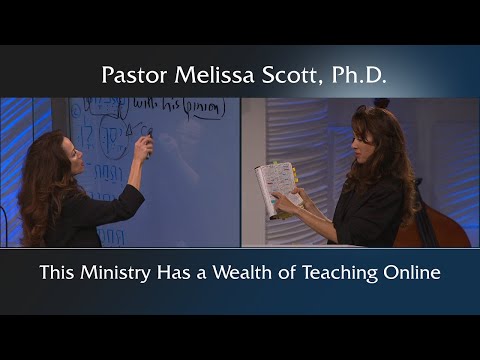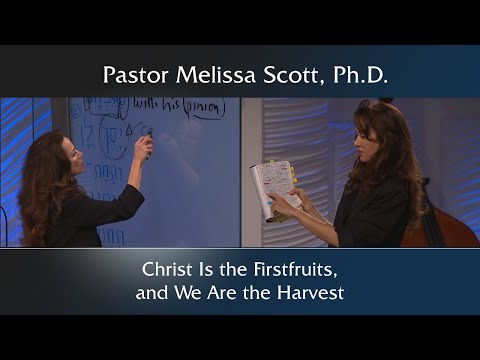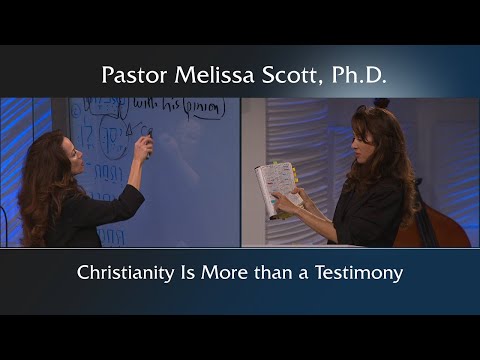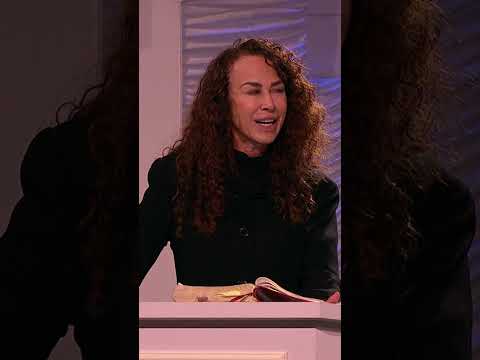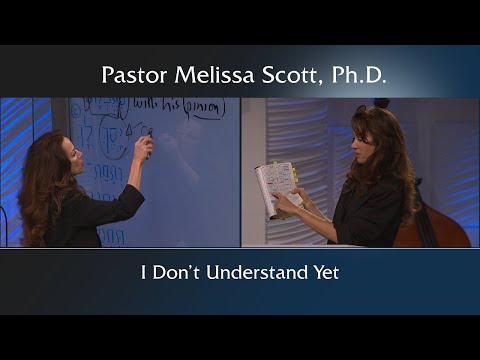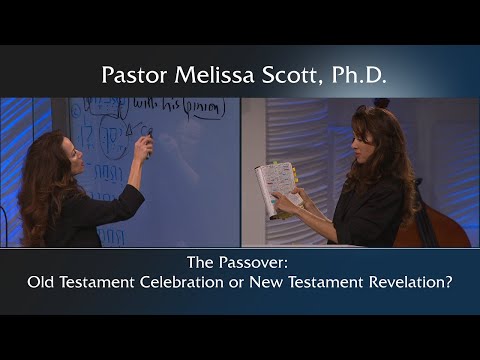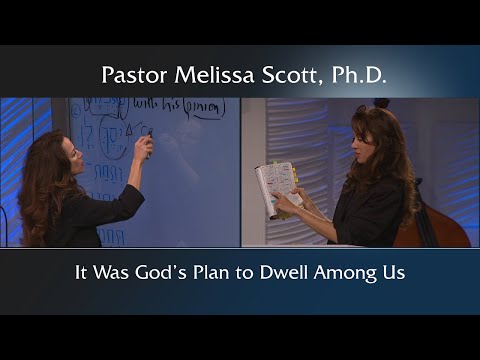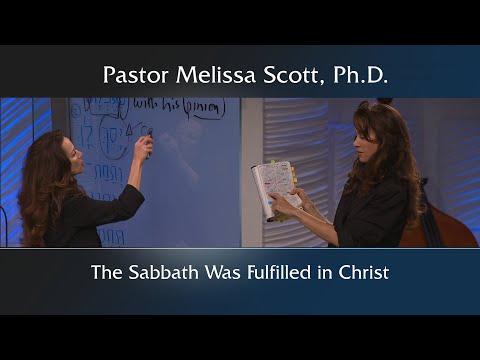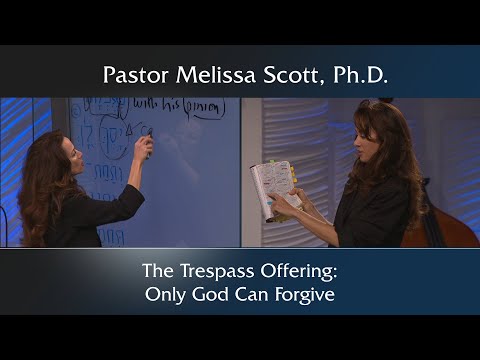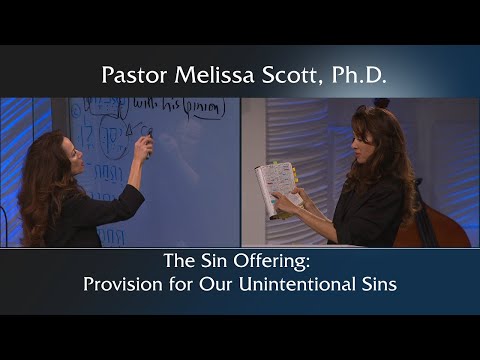We've been looking at the offerings. So there are five offerings. They begin in the book of Leviticus, the burnt offering, the meal offering; your Bible may say “meat,” but we are calling it the “meal offering” because, just think of it this way. The “meat offering,” we don't use that term in English anymore like they did when they were writing the King James. So there is no meat in the meat offering, so it's better to just say “meal,” right? That's easier to remember. Peace offering, sin offering, trespass offering. So in the burnt offering, the meal offering, and the peace offering, these all fall into a category we call “sweet savor.” What's interesting is if you read in Paul's writing, and I'll just read it to you because it's just one small verse, but he uses that terminology, “And walk in love, as Christ also hath loved us, and given himself for us an offering and a sacrifice to God for a sweetsmelling savour.” So even Paul made that connection; he makes it many times over.
But what I mentioned about this is important, and I'll, I'll give you the details a little bit later in the message. But when I said to you that Noah and Abraham's offerings could not have been sin offerings, is that what's attached in those texts is it was a sweet savor to God as it ascended. So anything that is “sweet savor” or labeled that way is never associated with a sin offering. So that's why I said that. I can back up things that I say. As previously mentioned also, everything in God's program mattered. It still matters, by the way, and there's still people making substitutions to their own demise. Then there are some, we'll call them refinements to the burnt offering. For example, in Leviticus 7 and verse 8, it says, “And the priest that offereth any man's burnt offering, even the priest shall have to himself the skin of the burnt offering which he hath offered.” So that's another important, there's just so many of them sometimes I think, you know, it's easy to let these things kind of pass and slip through the cracks, but here, even this, so the priest would get to keep the skin of the burnt offering.
So think of it this way, the skin could be used for a myriad number of reasons. I'm assuming, I don't know all the different customs of the day, but I'm assuming that a skin could have been used from anything, we'll call it functional, like maybe covering a seating area or part of your roofing, your housing, but generally speaking, skin across the board is used as some type of a covering, whether it's on a human or placed on something else, it's a covering.
And I found even this to be amazing because what was the burnt offering? Something that ascends up, wholly offered to God. In way of description, it personifies Christ's ministry on earth, right, wholly dedicated to God, ascending upward. But think of this, the skin that was offered, the New Testament says we are clothed in Christ's righteousness. Well, if the skin represented that which was offered as a type of Christ, imagine that this, this covering, if you will, that would have been given to the priest is almost a representation of being clothed with God's righteousness, except it's in the shadow, not in actuality. In actuality it's Christ. In shadow it may have been this skin. Now, I'm reading, I'll tell you what I'm reading between the lines and perhaps adding. This is speculation, but I think that there's reason to attach that there because it seems like, well, imagine how many burnt offerings, morning and night would be offered every day. That's a lot of skin.
Just think about it. You know how many people are in the camp night and day? That is a lot of skin. It's a lot of blood and it's a lot of skin. By the way, probably a lot of smoke too, if you think, no, I don't know. I think we maybe do a lot of caricatures about this. We see what fire in general looks like. You know, somebody's making a backyard barbecue; it's not going to be black smoke. But you're burning a whole entire animal. What do you think that's going to look like? Don't answer. All right, so in the meal offering, we saw, as I said, it had no meat in it, and the main ingredients in that offering: fine flour, frankincense, oil. So the big difference between the burnt offering and the meal offering, as I said previously last week, the burnt offering is a life offered up. And the meal offering, let's just say, was the fruit of that life. So life offered up, wholly consumed, and what's brought to the altar for the meal offering is what we as humans, you know, oil doesn't make itself.
Just, you know, does anybody think you just go out and say, “Ah, rain oil,” we have to make it, right? Like fine flour has to be pummeled. And so it's, it is the fruit or the labor of one's work versus the life that was offered. And I'm hoping at some point this will click with some of you because it's so hard sometimes to adequately convey a concept. But this one is so crystal clear to me. In the meal offering, we kind of get the idea overall of bread or cakes. And I know it's like it's, it's just a little bit around lunch time, so I start talking about bread and cakes, and in about five minutes I'm going to hear tummies going, grr, grr, grrr! (Laughter.) That happened last week or the week before and I was like, wow, it works, (laughter) all right.
But bread being the staff of life, of course and what we see in the meal offering, it's the ingredients that are placed in there give us a description as I referred to the fine flour. Immediately, I don't think fine flour sifted, I think of the bruised One. I think of Isaiah 53, “He was wounded for our transgressions, bruised for our iniquities.” If you think about it that way, the, the pulverizing, the beating, the smiting that would produce flour from its original state into the state it was in, somehow this is very representational of suffering, specifically the suffering of our Lord. So we can put some flesh and blood on that and see how we might understand it better.
I mentioned the, in the fine flour, no unevenness. Probably the most simplistic way to describe that is there is no change in Him; He is constant, remains the same. That's that concept of flour that is not lumpy or inconsistent; full of inconsistencies. Another difference between the burnt offering and the meal offering I described was the washing of water in the inward parts on the burnt offering versus the oil on the meal offering, but both are descriptive. Of course, the water as the word of God, washing the inner parts, we understand that through the New Testament, washed with the water inside.
It's what comes out of a person; it's already in you that defiles you when you, the Bible says when you open your mouth, but that's why you are constantly to wash your mind with the word of God, the oil on the other hand in the meal offering, representative of the anointing of the Holy Spirit. The meal offering was to be made with salt and emblem of course of perpetuity or preservation and also used against spoiling or corruption. So again, in Him, in Christ, there was no sin; there was no corruption. Let me just stop right here. In fact, I wish I could, there was a pause button so I can take a sidebar and I don't lose everything I've said. You know how often, how many of you have heard, usually it comes around Easter time, that Jesus had a wife, Jesus wed Mary, Jesus had sex, He had children with Mary – how many have heard that? Okay. So just so we can put things in perspective, if the Old Testament is basically revealed or expounded in the New and we read about no corruption, no blemish, no anything.
And listen carefully, sex does not defile a person but in the biblical realm of understanding that would be considered defilement and uncleanness if one was not married. Therefore, again, you either take this whole book and take it, parse it, try and mull it around and then you can say to the, to the people out in the world, “You're full of it; you don't know what you're talking about,” because if you want to go down the pathway that Jesus succumbed to impurity or temptation, then you're saying that all of this that I'm describing and the rest of the book cannot describe Him and He cannot fulfill it.
And that's a lie. So what I'm saying to you is if somebody actually scrutinizes this book enough and you're looking for shadows, types and clarity, you can know that He had to fulfill the offering of, without blemish, which means without bodily defect but also without corruption, which means anything that would have been immorally making Him impure in any way, shape, or form. And in this case, in biblical days, having sex without being married would have constituted what I'm describing. So that's why I'm saying to you, just un-pause now, come back to where I was. So this is why it's important to study the whole book. You can dispel a lot of stuff that is basically thrown at us to make a mockery of our faith.
That's all. You know, they mocked Jesus on the cross. That wasn't enough. They have to kill, still keep mocking Him all these years later. So that's the way they do it. But anyone who's reading this, a light will go on in what I'm saying to you because He is described as the Lamb of God that takes away sin of the world. Well, how could He fulfill that perfect offering if He Himself was not perfect and impure or corrupted? So save that for another argument in another day, but I just wanted to put that in there. All right, if the burnt offering represents the God-man relationship, I've said to you the meal offering and even the peace offering and probably more so the peace offering represent the other side of the Decalogue, the other side of the Ten Commandments, the fellowman-to-man relationship.
Why do I say that? Because the burnt offering offered on the altar was wholly offered up to God, the skin given to the priest, but that's almost like a sidebar, but everything else going to God. For the meal and peace offering, especially in the peace offering, you've got the offeror, God, and the priest all partaking. That's fellowship. That's communion right there. So if you split the first three offerings, the burnt offering to fit into the man-God relationship of the first five laws of the Ten Commandments, and the other five go into the meal and peace and the man-fellowman relationship where you see fellowship and communion, again interesting that the whole thing is fulfilled in Christ. Remember what it says about Christ and the law, “I did not come to destroy the law, but to fulfill it,” and in Him, indeed, He did fulfill both sides of the Decalogue to God and to man. All right, when we look at the peace offering, which we started to briefly, it too is classified as a sweet savor, but there's, as I said, something unique.
If you can read it in your own time, because I do not think time will permit for me to go through that text, but you will definitely see what I'm referring to as communion or fellowship of all persons or parties involved in that offering. The offeror feasts on the meat of the altar very much analogous to we who, and be very careful about how you interpret what I'm about to say, feast on the body of Christ. That's not eating, that is enjoying or partaking by reading, faithing, understanding all that Christ is and does for us. So in that respect, we are partaking of the body of Christ; we are, we make up the body of Christ, the church, but in the respect of the offering. We see man satisfied in Christ.
Through this offering, the offeror is actually feasting with God. So it's almost a circular bringing the offering, the offering is offered, the priest gets to participate, the offeror gets to participate, God is the, obviously, the intended recipient in full, but all get to be included in this offering. So there's something there that's very, we'll call it communal-like, which is kind of neat because you don't think of an offering as a fellowship or a communal activity. All right, the priest, remember I said to you in every, each of these offerings, you've got to peel back the offeror, the offering; the offeror, the person, the offering, the item, and the priest.
And in many ways, Christ will fulfill one or more of these, not just the priest, but a lot of times you can see double and triple meaning in things. So we can see fulfillment that occurs, for example, the priest who is our high priest Christ, but He's also our mediator. The Scripture says Aaron; you've got to follow this one, Aaron and his sons, or Aaron and Aaron's sons, the priest's children, his family get to partake.
So think of it this way, if you're going to make this extra complicated, we're trying to make shadows and types and look at the reality. So Aaron, the priest, his children, they all get to partake. We are heirs and children of God. So it's the same, if you look at all of these different types, they're the same; they lead us down the same pathway. This is why I get frustrated when people say, “Oh, that's the Old Testament. I don't want to read the Old Testament.” Well, you're missing out on a lot, because this fills in a lot of blanks that if you said, “Well, I don't fully, I, I'll read the New Testament, but I don't get all the nuances.” The nuances occur here, and then when you start reading it again, you go, “Why didn't I see that before?” because it needed to be pointed out.
All right, the peace offering could be a thanksgiving or better put praise offering, and that would be more like glorifying God. But it could also be done as a vow or a voluntary offering, which could correlate to service to God. So my hope is these are all concepts that are very generic that I'm putting out, but hopefully in your own time and your own studies, you'll go and kind of dig a little bit more, because once you start digging into what I'm saying, you're going to find all kinds of things that correlate. So the peace offering, one of two, understood in one of two ways, either as a praise, thanksgiving, which would be for us in New Testament times glorifying God, or as a vow or voluntary offering, which could be analogous to service to God in our time.
The law of the peace offering is found in Leviticus 7, verses 11-38. It's pretty lengthy, and it kind of gives you all of the minutia of the offering, in your own time, if you will. But there are two things I want to point out that are itemized here within these verses. And one of them speaks of the fact that Aaron and his sons received as their portion of the peace offering the breast and the shoulder of the animal. And again here, there's beautiful pictorial images put forth; the breast always in Scripture being represented as the heart, the place of emotions, the place of care, empathy, concern, and the shoulders, what would be basically analogous to power or carrying a load, the burdens, if you will.
The priests in this day were a microcosm. They could not even achieve what Christ is to us. But think of it this way. The New Testament says Christ loved us and He died for us. You see, even if you go back into the Old Testament, nomenclature of El Shaddai, the breasted one, the one who yes, at in Him all sustenance, everything is found. But that's not just the nourishment, if you will. It also flows to the needs, our emotional and spiritual needs. He can provide all of that. So think of the breast that way. The priest's portion was that, the priest's and his sons'.
We are the children of God. This is also ours to partake. We receive the love of God. We may love God, but we receive the love of God. He loved us first and gave Himself for us. And the shoulder portion, which in human terms, not in animal terms, but in human terms, the shoulder is usually representative of power or burden bearing, and He is that to us as well. So even in these offerings, the symbolism is powerful. And you go back and you read these chapters where there's all this kind of very dry, boring detail, but when you start to see Christ there, you start to think, this is, it becomes a little bit more like, yeah, I can see the details that maybe in reading the New Testament one can understand, but we'll say the full details or the coloring may not be there. They're here. That's where you find them. Okay, so now we're going to approach the sin offering. And this is the other thing that if I could have one wish in life, it would be this, that I could stop hearing people say this – that they came to the Lord and now, you know, they've been set free and they sin no more.
We are sinners. We have two problems. We are born in the blueprint. You come out of the gate messed up. It's the best way I can say it. That is the condition we are all; you know, if you want to go out there and deny it and, “Nah, nah, nah, nah!” go ahead. But that's what it is.
See, this is what makes me sometimes smile like the cat that ate the canary. Everybody wants to justify, well, they want to seem superspiritual and rationalize their behavior. But if you really go back to the thought process of, we are born in this blueprinted fallen state. A baby is beautiful and innocent, but a baby is born in that state too. It doesn't just, okay, now the baby quit being cute at the age of seven and it's no longer – no, it doesn't work that way. You came out of the gate, fully contaminated in the blueprint of Adam, and the only cure for that is coming to know Christ and what Christ did and faithing in Christ. So you've got the condition of man. It might be easier to say this like this: you're born with a congenital problem. It's called Adam's nature, fallen. That's our congenital problem. Everyone born into this universe has that congenital problem. Now don't come and argue that you're okay; that's the condition of humankind, and then separate it with the fruit that is produced from that nature.
The fruit from that that is produced from that nature is what most people get hung up on, “Well, I don't drink and I don't smoke and I don't cuss and I don't do this and I don't do that, blah, blah, blah,” right? And they're hung up on that and they, you can talk about that until you're blue in the face, but that's not going to excuse you from your congenital problem.
You see what I'm saying? So two things must be dealt with and they're both dealt with in Christ, but in the laws they were separated. Now how can we be sure that what I'm saying is correct? Because I always want to make sure that we're so crystal clear on these things. So if you turn to the fourth chapter in the book of Leviticus, just follow what I'm going to read. I'm trying to figure out if I want to see how this is done in the NIV here for just, just give me a second. I want to see how what they call it before I start reading.
Four, oh, okay. Well, I actually like both of these terms, so we're starting in a good place. I'm going to read both of them to you. “The LORD spake unto Moses,” this is the King James, “the LORD spake unto Moses, saying, Speak unto the children of Israel, saying, If a soul shall sin through ignorance,” if you're interested the Hebrew word is shegâgâh, okay. You're going to find this word repeated “through ignorance.” The NIV, very interesting, “The Lord said to Moses, Say to the Israelites, When anyone sins unintentionally and does what is forbidden in any of the Lord's commands.” So the sin offering, now there are some minute details. So this is very generic, don't, don't get all crazy on me if some of you know the minute details, because we're looking at the more generic concept right now, through and through will be unintentional through ignorance, sinning through some; you did not know, “Oh my God, I didn't know.” Now, by the way, this focus on the sin offering is not so much on acts committed, I'm going to read it to you in a second, but on people.
So I want you to think of this, the first category of people that are being addressed in the sin offering are the priests, “If a priest that is anointed do sin according to the sin of the people; then let him bring for his sin, which he hath sinned, a young bullock without blemish unto the LORD for a sin offering,” okay? So the first category is priests. In fact, let me just give this a breakdown quickly if you want to write it in your margin. The priests are being addressed in verses 3-12, the congregation in verses 13-21, rulers 22-26, and in verses 27-35 it is the common people, whatever that means.
I don't know what difference with the congregation, common people. I'm assuming it means people outside of the congregation. Although I was scratching my head and thinking, if you lived in the desert around the tabernacle, I'm not sure how you could be a common person, maybe a random traveler. I don't know. Don't ask me. I didn't, I didn't write it. I don't know. Never mind. That, that will hit you later. Okay, so you can see people are being addressed over and over again, but it starts with the priest. This is very, very, very- this point is probably the most important thing I want to talk to you about right now.
God who approved of these priests, who chose, who let them be anointed, and yet they could still sin a sin of ignorance; unintentional breaking of some law. Now, ask yourself, what could that be? Because they're not exactly laid out; they're not spelled out. It doesn't matter. I'll tell you what matters. What matters is that God started, if you look at it, He's got priests, congregation, rulers, and people.
But He addresses the priests first. This ought to tell you, we have to stop this nonsense. There is no pastor, man or woman, that is perfect. That doesn't mess up daily and perpetual. I don't care how holy and spiritual they sound, or they look like, or they talk. We're all human. Get, get that and we're good. There's nothing worse than people putting a pastor on a pedestal, which puts extra pressure for somebody to have to feel like, “Well, I've got to, I've got to walk above the line.” No, I don't. I walk the same line you do, because I'm human like you. And I probably make more mistakes and more mess up than you do and they're not, they're not intentional. They're not evil by design. But we have to stop this idea somehow; and what, what the line between ignorance, unintentional, and blatant blasphemy and intentional sinning, different story.
Well, we can come back and talk about that later. But this is unintentional: “I did not know”" We're not talking about “I knew, but I'm just going to say I didn't know when I get busted,” because God knows the difference. He starts with the priest and listen carefully to what is said here, “If the priest that is anointed do sin according to the sin of the people,” that means; just indulge me in this, that means if this person should happen to engage in ignorance like any other person.
And this is why I get very angry when people say, “Well, pastors need to be held to a higher standard.” There's a difference between my stewardship responsibility to the church, to God, the management of assets and money and responsibility versus being a human being that can and does make mistakes. And I do them all the time. Does that make me less to say that in front of you, to admit it in front of you? Absolutely not.
It makes me one hundred percent human and relatable and not somebody who's up here playing church, but saying, “This applies to me as well as anybody else.” Now, if you go through these line by line, I want you to notice something. So I addressed the priest and it gives the prescription for the priest bringing his offering, all right? Then you keep reading and it goes down to, “And if the whole congregation of Israel sins through ignorance, and the thing be hid from the eyes of the assembly, and they have done somewhat against any of the commandments of the LORD concerning things which should not be done, and are guilty; when the sin, which they have sinned against it, is known, then the congregation shall offer”- now you tell me, if the children of Israel did not have, did not yet have the law given to them, Moses is up in the mount, they want something to worship.
God had not yet uttered the words that would become absolute. He had spoken the words to Moses. We know that. But in terms of application, tell me that you can hear something once and go, “Mm, got it.” Sometimes yes, but a lot of times you need to hear things repeatedly. Now it surprises me that the people would have to hear, “Thou shall have no other gods before me. I'm a jealous God.” All the things that God said He did not want them to do. But we tend to, again, we caricature the law was given and then they went, “Okay,” and they went out and they practiced it all, right? Wrong. Think of how many people may have vaguely heard, some didn't hear, some didn't even care to listen, so it would be very easy to take the incident of the golden calf, which happens in Exodus 32, I believe, and put that in the category (even though in my mind's eye they had to know it was wrong), but that could be possibly a concept of whole congregation falling into sin.
I, I don't know how else to describe this one, but I can tell you if you keep going and you read about the ruler, it says the thing, the same thing, “When a ruler hath sinned, and done somewhat through ignorance,” so that key word or “unintentional” is repeated throughout everything that is pertaining to the sin offering, all right? So I want you to kind of just put a note there.
If there's one word to label at the head of chapter 4, it is “ignorance” or “unintentional acts,” so that way when you're flipping through it, you can see that's, that's the big header. Now there are, there are micro-definitions here that we can glean elsewhere, not here. But what's important with this is we see the classification, so God deals with priests, He deals with congregation, He deals with rulers, and then He deals with the common person. And I think the reason for putting in the rulers and common people, I was reading, it's an old-timey booklet and they have a lot of kind of quips. It's “Sermonic Saplings,” I think it's called. But it's a contribution of a whole bunch of authors.
Normally I'd give you some credit, but I think this one was actually anonymous. And how this was described, I think, was pretty adequate. It said the difference between the ruler and the common person might be as such. Think of the ruler as the big clock in the center of town that everyone can see for miles away and the common person simply is wearing their own personal watch. So whatever the ruler does, it's seen on a large scale, whether, if that's a good definition or not, I'm not sure. But to say basically, one would be much more obvious probably and made known to more people than just the common average person.
And it's also interesting; I don't know why they did this though, “the common people sin through ignorance.” So again, we may be discussing the difference between congregation and congregant, or we may be discussing congregation which includes congregants and all other people. I'm not sure. I tell you what I'm not sure, I'm not sure. In any case, if you read through this chapter, you will find one thing. There is no description of the acts committed, only people being addressed: priest, congregation, ruler, common people. Okay, so pretty important to kind of put that in perspective. Now, I also urge you to notice something else which is kind of important. If you're looking at this section, chapter 4 is 35 verses. If you compare that to the burnt offering at 17 verses, the meat offering or meal offering at 16, peace offering at 17, and the trespass at 19, this section covers the most, has the most verbiage in it.
And interestingly enough, it gives you the least detail on what these unintentional sins are. It's kind of interesting. Okay, this offering would be offered with and during all feasts, Passover, Pentecost, Trumpets, Tabernacle, Yom Kippur, which is a category all of its own, which we will talk about. And it would be offered, this sin offering would be offered in the same place as the burnt offering, which is kind of, think about it, if you think that the burnt offering is something good and wholly ascending to God, and this is designed for unintentional, “Oops, I didn't know,” being offered in the same place. That's pretty spectacular. That's one. The burnt offering, of course, was voluntary, but the sin offering was mandatory, not discussable.
The burnt offering, as I said, ascended up. And if you read about the sin offering, it is poured out and downwards. They, these are kind of some differences between the two. In the burnt, meal, and peace offering, sin is nowhere in sight, but in the sin and trespass, they are expiatory in nature, meaning it would be required minimally, if you go back to the instructions here, it says in, for example, “For the priest he shall bring the bullock unto the door of the tabernacle of the congregation; and he shall lay his hand upon the bullock's head.” So expiatory in nature, usually also in a vicarious way, so by the laying on of hands, it is the transference, if you will, of guilt, whether it is known or unknown, onto the animal, so expiatory in nature.
The other thing I said previously. The burnt offering, the meal offering, and the peace offering were technically, in their technical terms, acceptance offerings. Now, I need to clarify this because somebody will twist my words as they usually do. I described Christ as being a burnt offering in that His life was laid down, wholly offered to God, but He did not need acceptance of God the Father. So when I say it's an acceptance offering, the offeror offering, essentially as it went up in smoke, it was appeared to be fully accepted by God. So I need to, I needed to make that clarification in case somebody goes back to the, “I accepted Jesus” mindset, which I've told you, it doesn't work that way.
I don't care how you- some people just want to pound their fists, “Aw, blah, blah, I accepted, I,” well that's fine. You can, you can accept in your mind, but He decided long ago whether you'd be in or out, okay? That's an easier way to put it, like way back there, before I was even conceived, God said, “I, I want that. I want that which is going to be called Melissa down the line, somewhere in the, in the future, that's Mine.” And maybe to others He just said, “Meh, whatever.” (Laugther.) Transcribe that! (Laugther.) Okay. Okay then; still trying to get serious, all right. A large part of the problem here is that when we discuss sin and trespass offerings, we get so hung up on wanting to classify the sin, put that in the trespass category, but we get so hung up on wanting to clarify, itemize, label that, that which people do, which is okay, you want to do that.
I don't do that, but if you want to do that, but probably the more important thing to, the starting place is to consider the nature. Without understanding that, I am sorry, I don't care who you're listening to as pastor, who's, or if you're self-educating yourself, you will not understand what's wrong with you and why you need Christ if all you can do is produce a checklist that says, “I, I did this, I did that,” because sin inherently, before you can commit an act, as I called it, and it's perfectly designed this way, a congenital problem.
Something that you had from birth, in your DNA, it is, that's the way you came out. If you are not willing to address that, you can't even get to the problem of your trespasses. So I am a sinner. I know I sin. The fruit of my congenital issue are the things I do. And the only remedy for that, there's only one. Now when I read; this is the tragedy. When I read, these folks came to the door and they offered their offering and vicariously by the laying on of hands, it could have technically given them, I would call maybe a sense of momentary relief, but this is why it had to be done on such a regular basis, because it's what the book of Hebrews says. How could that ever wash and cleanse you on the inside? How could it ever free you from the contamination that's called sin as nature? How? It cannot, it could never.
That's the problem is when you, when you think about this, God laid all this out to teach the people, essentially, this is going to sound weird, but this was all teaching the Old Testament saints about God before Christ was in the flesh, but teaching about Christ's work. So failure to understand from the get-go, I came out with a problem. I don't even need to do anything. The initial thing, the condition, my nature needs fixing, but I can't fix it. Only God can. Now God could have done so many different things here, but He chose to do it through animals, teaching a principle that a life must be laid down and sacrificed, that blood must be spilled. There's a whole litany of things that you could parse through this, but it's teaching us something about us. Failure to grab hold of this lesson, Christianity 101; you know, there are people sitting in churches this morning and whatever their, their pastor, minister, priest, whatever, spoke with them, but I highly doubt that this is a concept that is being reiterated on a regular basis to people who come into the church.
And as I said, that's part of the problem because failure to not know exactly who you are and what's wrong with you produces people who are confused. Just go out in the world and you'll find it. There's a lot of confusion out there. That's because people are even confused; the, the argument, I've settled this in my mind, there are people who still want to talk about, “Well, we evolved.
We, we're, you know, we're a product of evolution.” You can argue that all you want, but if you really want to sit down and have a knockdown drag out with me, I'll take you up. And I think I can prove to you that your argument, which you have been indoctrinated with, you, you may not want to call God “God,” but there was a supreme Creator, however, whatever name you want to put on Him. And He wasn't going, “Okay, let's see if we combine the A and the B and the C, we'll come out with D.
And D will be the new specimen that will evolve into D1, D2, D3.” It doesn't work like that, especially when you get into analyzing what we've, we grew up, we all probably grew up on this. You know, the chart that shows the chimp-like, ape-like, you know, we're going from this, “This is how I wake up in the morning, this is me.” There's evolution for you! “So I wake up in the morning, (laughter) midday, I've evolved; I can stand up straight.” We all grew up on that. The problem is when you start looking into DNA and you find out what's in your DNA will tell you that you and I have been fed a lot of stuff under the guise of “science.” Oh, who am I talking to; you guys already know this, you know, “Follow the science.” Yeah. How did that work out for you? So what I'm thinking here is this, you know, if, if we really take hold of concepts like this, being born in a congenital state that has a problem and the cure to that is Christ, then what I'd say to you is talking about how good or how bad or, or whatever it is you want to add to the conversation is, it's going to be nonsensical if you're not willing to deal with what you are first: fallen.
That's why Paul wrote, “All have sinned and fallen short.” Can you imagine that? A man who's so steeped and well versed in, there was only Old Testament at the time and he says, “All have sinned, all have fallen short.” Even he could figure that out. I wonder why in this day and age people cannot see that, but let's leave that for another day. All right, so in the classification for the way animals are presented in this offering, as I said, if you remember in the burnt offering, I told you that God made provisions for poor; rich to poor, so bullock all the way down to turtledove.
In the, in the meal offering, it's described by way of, I hate to say it, by cooking ware, right? Like if you, maybe if you're rich, you had an oven, but if you were a poor person, you might've just had a pot or a pan, which probably gave birth to that expression, but anyway. All right, a couple of really smart people here, following my humor. The rest of you, I'll wake you up when it's over. But even in the sin offering, we have different categories all the way down to God saying, “If you can't offer an animal, you can bring an ephah of flour,” which is kind of interesting. Of course, there would be in the sin offering, there would be no oil and no frankincense. Now think about this, the sin offering, acts committed unintentionally out of ignorance; no oil put there. No Holy Spirit guiding, right? And no frankincense, and I talked to you about frankincense, how when it's heated or burned, it releases its fragrance, but here in type, it also is a type of holiness, righteousness of God. So in neither one of these, you; it kind of goes to make sense, it's intuitive to say that in, in this sin offering, neither oil nor frankincense would be used or appeared as their types.
If you are being guided, now listen, if you're being guided by the Holy Spirit and you live and walk in the Spirit, you can still make mistakes. You can still do things unintentionally. But for the application, making the distinguishment between sin and trespass, just kind of keep that there. It'll help you to remember the differences between these offerings and what they represent. The blood being sprinkled upon the altar of incense made it clear that until this portion of the offering was completed, in essence, every other aspect of worship ceased. That's kind of interesting. Now take it from another page in the Bible. You remember when the whole camp was stopped? Actually, it happened several times, but the one specifically I'm thinking about is in that famous passage where the whole camp is stopped to find the item that was stolen. Do you remember that? (Yes ma'am.) So nothing could go forward, although that was an intentional act, but just say that everything stopped, everything ceased.
So you could try and go from that angle or you could say it the other way, which is a lot of times not so much for unintentional, but usually for things that we do premeditated; we thought about it and we did it. Usually that builds a wedge between you and God in your communion, in your fellowship, in your- you notice somebody who stops reading the Bible, who stops praying, who's less involved, it becomes easier and easier to do that, and actually the wedge gets bigger and bigger and bigger if you let it be because God is not forcing you, and we always have this propensity to go to the easy way, “It's easier this way.” So all of the sacrifice that was going on had to be completed before anything else could be resumed. The sprinkling of the blood now, I just said on the altar of incense, but they also sprinkled blood depending on who offered on the brasen altar. That restored the children of Israel. The sprinkling of blood upon the altar of incense was for the priests. So there's all these little details involved there.
And you might say, “Well, that's weird; a brasen altar for the children of Israel?” Well, think of the brasen altar, the place of, we'll call it judgment, justice, whatever, versus the altar of incense. And you might say, “Well, that's kind of unfair. So basically the priest's offering is almost like pray to be forgiven versus the average person or the congregation that's still going to judgment.
That's kind of unfair,” but that's the way God prescribed it. We also have to deal with the fat, the fat of the offering. The higher the categories of offerings, the fat was burnt upon the altar. When I say the higher the category, the highest quality of offering, the fat would be offered on the altar. The lesser categories, not much detail is given. It's almost like God was saying, “Oh, you get down to that, there's a little bit of fat, oh, who cares? I'm not even going to talk about it,” right? So I don't know if that was intentionally, if that was unintentionally or intentionally omitted, I don't know. But the fat represents, we'll call it the life force, the vitality, the spiritual health of the being or the individual, if you want to put it that way. So it would essentially signal that it was accepted by God. So even though it is not a sweet savor, that portion of the offering being offered up would be like saying, “Okay, all has been accepted,” like, “Okay, everybody's happy now, you can all go home.” The body or the carcass is cast without the camp.
Once more, the lesser offering doesn't specify what to do with it. So perhaps one area of confusion that I need to address if I haven't confused you enough today is in the higher categories of sin offering, and it's called as such, a sin offering, as I said, no act or trespass is mentioned. In the lesser categories, we read some, sometimes the offering is referred to as a trespass offering and other times a sin offering. That's why I said, I gave you the generic perspective, the whole, but they're minute details. So sometimes you're going to find when you're studying this, sin offering on the lesser degrees may be referred to as the trespass, and they sometimes get almost confused or interchangeable, so just note to self, if you read, don't get confused about that.
And I would highly suggest something. You don't need to go out and buy a Bible. Go online if you don't have- I'm sure most of you have multiple versions of Bibles at home, if you don't have The 26 Translation, go online. There are places like; one of the sites is like Bible Hub, where they've got side by side translations and versions. And it would be very, very helpful, especially for people who wrestle with reading through these passages. Go on there and find a version that you actually can read through, like a breeze, because that's going to help to give you the nuts and bolts. Don't worry about, “Well, this said, this here,” get the gestalt of it first, and then come back to your King James to read and fill in the details. I think that's going to be extremely helpful. Okay, I want to go back to one or two last things before I wrap up here, something interesting that I found when I was studying for this fourth chapter sin offering.
Take a look at this. So, for the priest, it says, “The priest shall make atonement,” I'm sorry, for the congregation, it says, “The priest shall make atonement for them.” For the ruler, it says, “The priest shall make an atonement for him in his sin.” For the common person, “The priest shall make an atonement for his sin which he hath committed.” It's almost like as you get further down the road, we have a greater elaborate- not so much, it doesn't tell us what the sin is, but we have a greater expansion.
So, it goes from just making “atonement for them,” “for him and his sin,” and then “make an atonement for his sin which he hath committed,” almost as if; I hate to say this, but almost as if the magnifying glass has been turned up exponentially on the common person, not so much on the priest, the congregation, and the ruler. I think that's pretty fascinating. Why? Because it will be the bulk of the common people who won't know anything or not too much about God, who would be the most likely to do those unintentional things, so it's kind of interesting the way God's word works that out. I think it's very interesting. So, probably the last but not least here, as I said, I'm going to bring this to a close, is if we look at all of these, and we'll, I think I want to go back and put in some more detail for you because we; sin and trespass, as I said, are probably the, the heaviest categories for us to wrap our minds around and be clear about.
But I think the big thing for me is when I consider what today's society is peddling as- we don't talk, no one talks about sin anymore. No one does, and that's pretty obvious. You know, people can be outraged and they can pound their fists, but you know, an example, for example, of what just happened here in California, some of you who like the Dodgers, you may like sports. I don't; personally, I'm just giving you my opinion. I don't care for that. But I don't care for seeing a bunch of people with painted faces pole dancing on a cross. That's blasphemy. That is to anyone who actually even has a modicum of understanding.
That's the highest disrespect that you could show to my faith, to my Lord. I'm not saying worship the cross because we don't. That's the instrument that He died on. That's all, but still making a mockery of it. So you might say, “How do you apply what you're talking about, which is so disconnected from today's society?” I'm telling you. People who have no God, who are indoctrinated and they make up, they make up as they go; it's all accepted.
It's, it's accepted whether it is intentional by design, which I think in the case I just mentioned it was, but some of them are completely unintentional, and done out of complete ignorance because there is in this universe seemingly, in the world we live in, much less God. Even when you think about it, there were, apparently there were some mass baptisms that occurred a couple of weeks ago in California based on the Jesus movement and the movie and everything. People went out in droves. When I was reading the article, the article told me- I, I love the idea that people came out in droves and it was a mass baptism. That's amazing. But I, I would have really loved to have been there maybe about a couple of minutes walking distance from where these people were baptized to ask them, “Do you know what you just did? Do you understand what you just did? Do you know why you just did it?” because the article told me that the bulk of the people could not have known; something very rote and robotic. That to me is an unintentional lack of understanding theologically of what you're doing and it's your responsibility.
If you can't figure it out, find someone who will tell you, and don't just say- I never tell you, “Take my word.” I tell you, “This is what I'm saying, now you go look it up and you go find the, the backup to what I'm saying.” The foundation is there. You do the research. I never want someone to say, “Well, you said this and,” no, go, go check out what I'm saying. And this is why these lessons, although they seem far removed, they are not. They're very applicable to today. Often sins against God, whether intentional or unintentional out in the world are just trivialized. They're marginalized. There are no consequences. For me, I think the bigger thing is if I would put a label on the fourth chapter of “unintentional,” I'd also attach to it if it was possible to understand that maybe unintentional sins may have been a lack in their day as well as ours of morality, of just being decent. But that's for the reader as you parse these verses to figure out, not for me to micromanage in your thoughts.
But what I want to say to you is there's so much in here that helps us, anybody who's struggling to figure out “What's wrong with me? Why am I not making progress with the things of God? How come I'm not advancing?” start here. Maybe the foundation of your starting point wasn't clear enough. And I'm going to say it for the last time. Your congenital problem affects your behavior and the fruits of that behavior become sin that people check the box on.
They become more worried about that than about dealing with the nature. And this is why this book helps us to understand there are two different concepts. They blend into one, but two different concepts that must be understood separately to understand how much of God's grace, how great a God we serve, that He would make provisions not just for the things that you can check a box on, but He also made provisions for things that you had no clue you were doing. That's a pretty remarkable thing. Now while most people have some premeditated bad ideas about God, “Well, God just hates everything and He's just a killjoy,” how about the God that was gracious enough to say, “If a soul sins unintentionally, unbeknownst to you, here's provision I've made for you because I know what your condition is.” That tells me I'm in really good hands with the God I serve because He recognizes there are things that I may know absolutely, I've been schooled on and there are things that I may not know.
And He takes all of that into account and says, and by the way, He didn't say it here, but the words tell me, even here, God loved the people. He cared for the people. Now we have the full book and we know the full thing and the full picture is this. God says, “I know you're not perfect, but I need you,” the believer “to understand one thing: this is flawed. You may have been created perfectly in Me, but this is flawed by nature, by the blueprint, and then everything else that happens after that, they both have to be dealt with.
And if you can understand that,” God speaking now to us, “I can help you to deal with things you know about and things you don't, because I'm the God that forgives.” And if you read carefully, very interesting, many times over here, “And it shall be forgiven them,” verse 20, “And it shall be forgiven them,” verse 26, “And it shall be forgiven him,” verse 31, “And it shall be forgiven him,” and the last one, verse 35, “And it shall be forgiven him.” So even there God was speaking and we have something and someone infinitely better in our Lord and Savior Jesus Christ.
We too, not only shall be, but have been, and that's the most blessed state to be in. If you want to hear more, be here next week. That's my message. (Applause.) You have been watching me, Pastor Melissa Scott, teach live from Glendale, California, at Faith Center. Service starts at 11am and all are welcome. If you'd like to attend, simply call 1-800-338-3030 to request your pass.
If you'd like to listen, watch, and learn 24 hours a day, simply log on to our website at www.PastorMelissaScott.com There you will find teaching from the Old and New Testament, from the ancient languages of Heberw and Greek, word studies and perhaps, if you stay tuned, that nagging question you've had about the Bible. Something that you've wanted to know will be answered. I hope you come out and join us Sunday morning, service starts at 11AM. See you here..
As found on YouTubeWatch The Video Below To Find Out How YOU Have Been Programmed To Study The Wrong Way All Your Life And Because Of This YOU Have Achieved Far Less Than What You’re Capable Of!
 $69.⁰⁰ / bottle $49.⁰⁰ / bottle (6) $59.⁰⁰ / bottle (3)As found on YouTubeWatch The Video Below To Find Out How YOU Have Been Programmed To Study The Wrong Way All Your Life And Because Of This, YOU Have Achieved Far Less Than What You’re Capable Of!
$69.⁰⁰ / bottle $49.⁰⁰ / bottle (6) $59.⁰⁰ / bottle (3)As found on YouTubeWatch The Video Below To Find Out How YOU Have Been Programmed To Study The Wrong Way All Your Life And Because Of This, YOU Have Achieved Far Less Than What You’re Capable Of! $69.⁰⁰ / bottle $49.⁰⁰ / bottle (6) $59.⁰⁰ / bottle (3)As found on YouTubeWatch The Video Below To Find Out How YOU Have Been Programmed To Study The Wrong Way All Your Life And Because Of This, YOU Have Achieved Far Less Than What You’re Capable Of!
$69.⁰⁰ / bottle $49.⁰⁰ / bottle (6) $59.⁰⁰ / bottle (3)As found on YouTubeWatch The Video Below To Find Out How YOU Have Been Programmed To Study The Wrong Way All Your Life And Because Of This, YOU Have Achieved Far Less Than What You’re Capable Of!